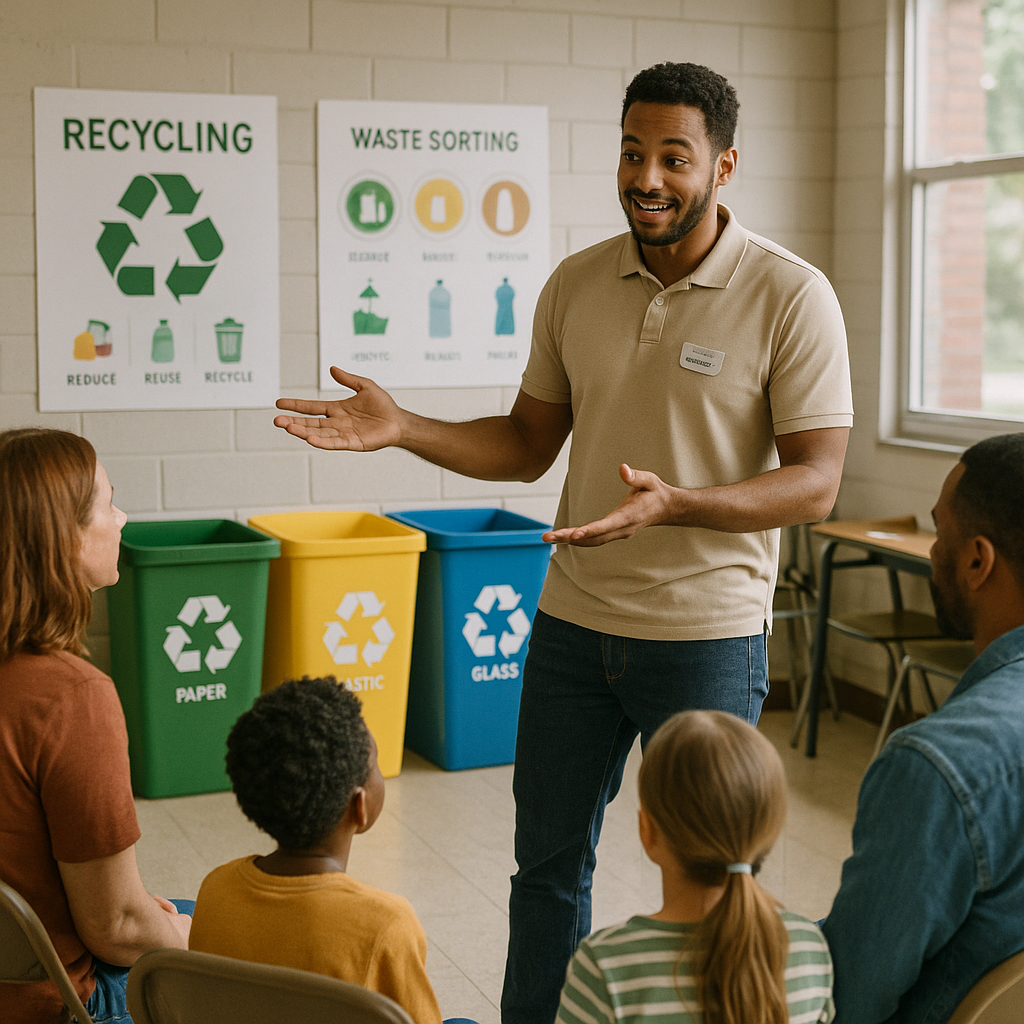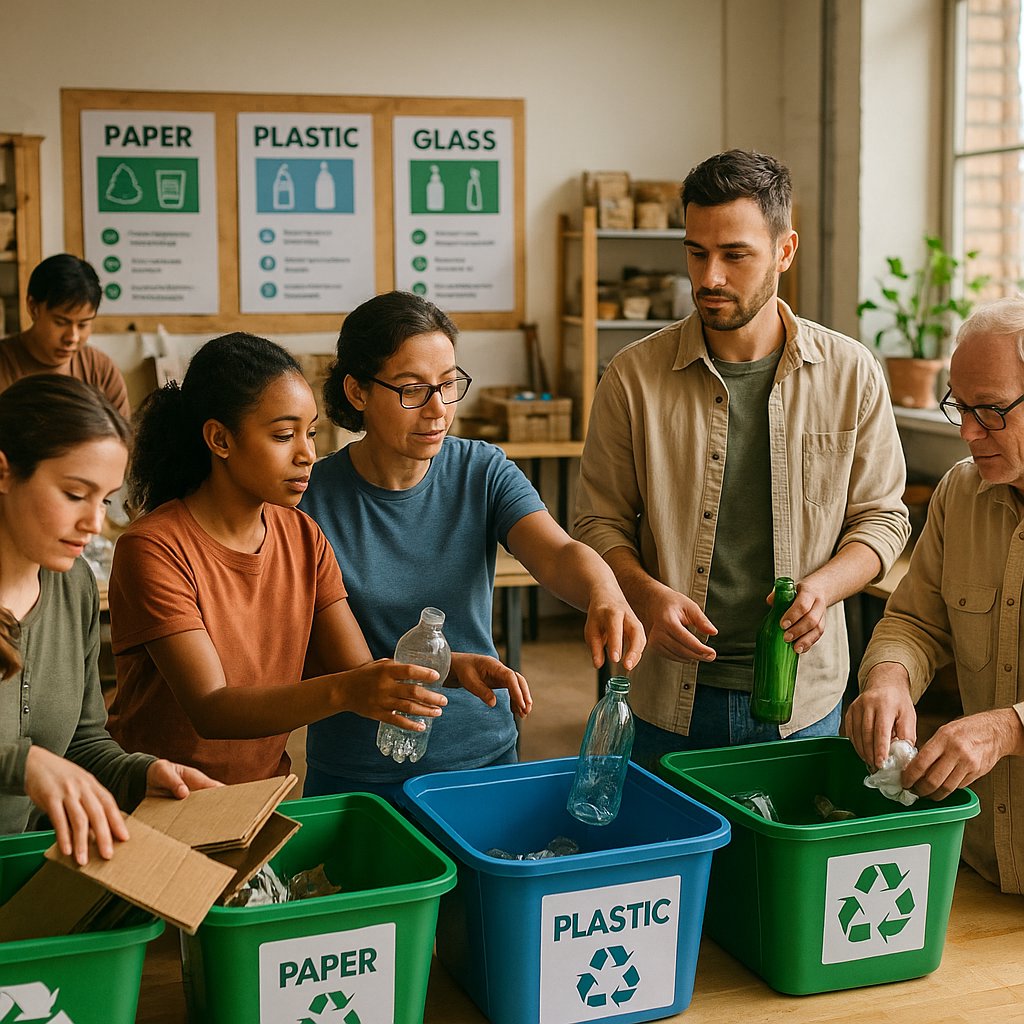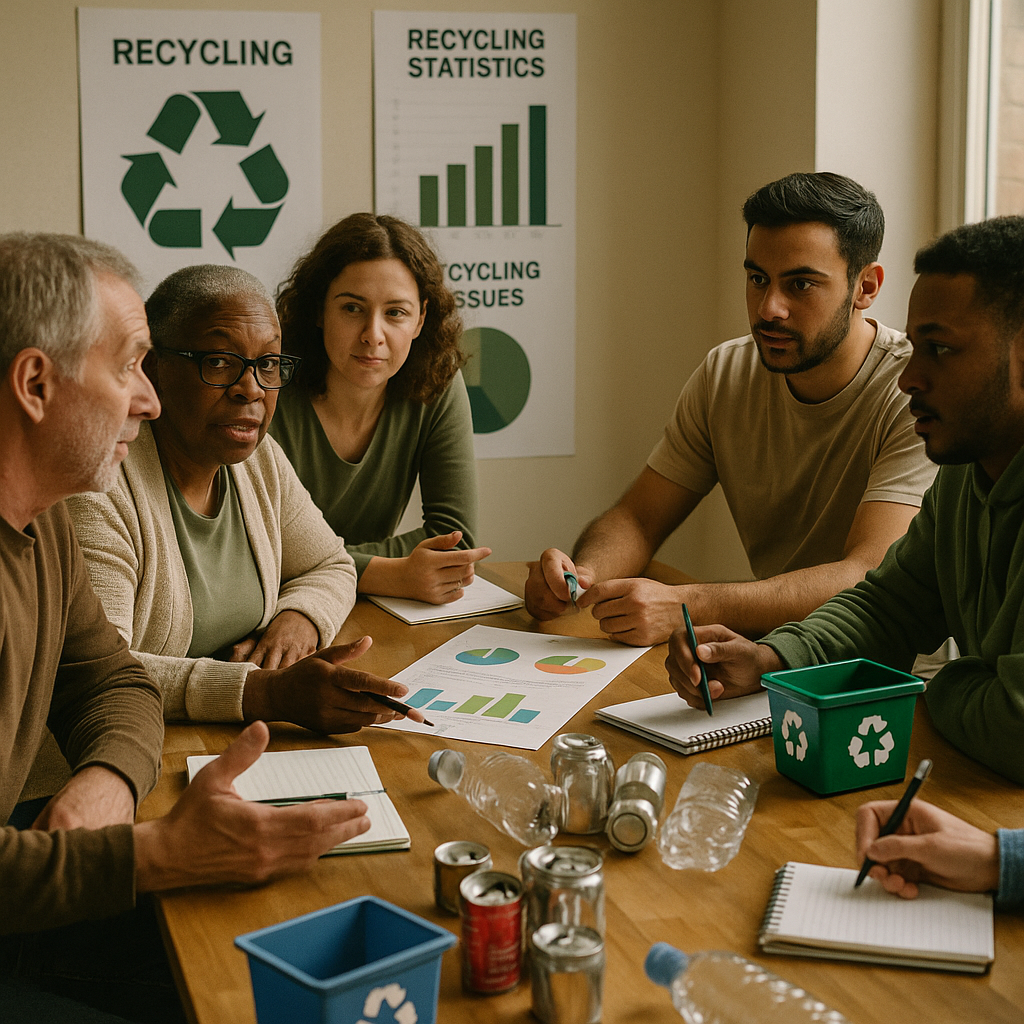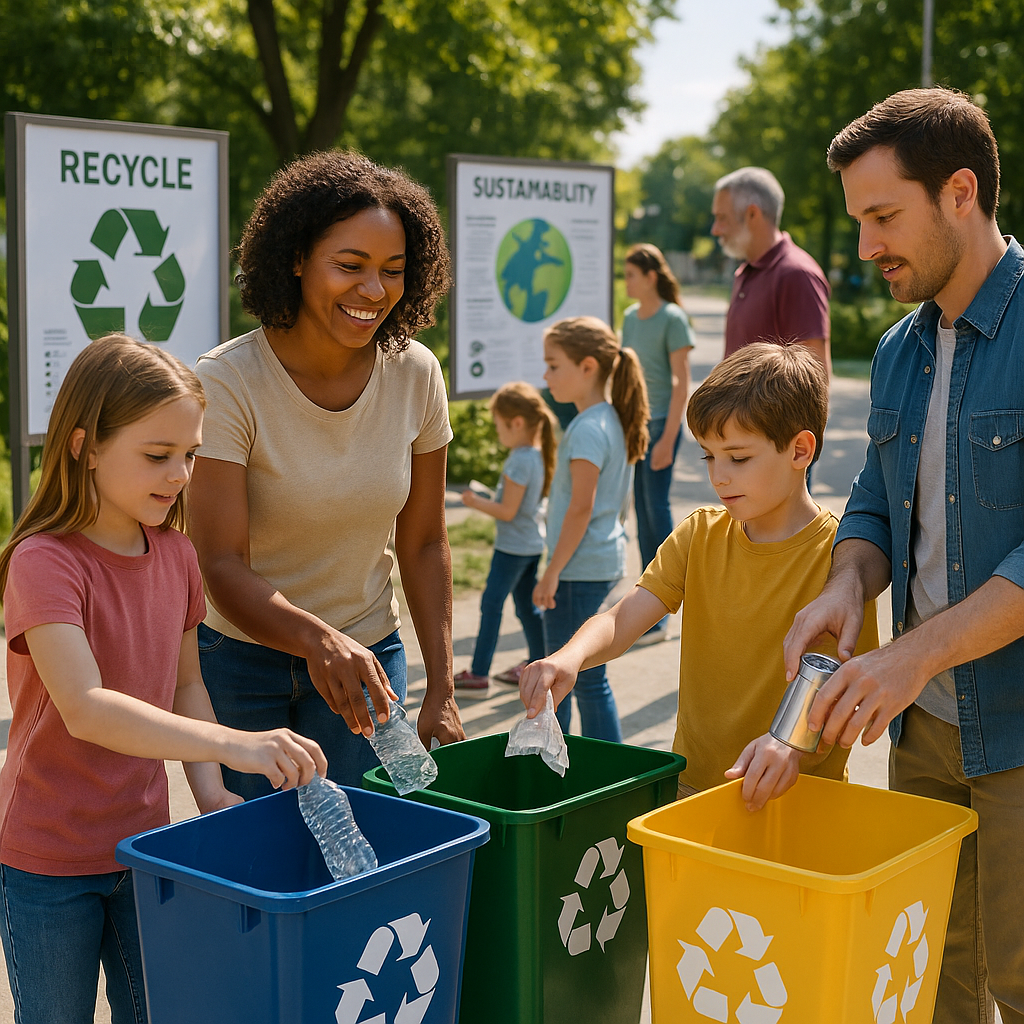5901 Botham Jean Blvd, Dallas, TX 75215
Recycling Education for Communities: Everything You Need to Know
June 18, 2025Every day, communities across the country face increasing waste challenges. Recycling education provides a practical solution by teaching residents how to manage waste responsibly. Essentially, recycling education for communities involves organized efforts to inform people about proper recycling methods, the importance of waste reduction, and the environmental impact of their disposal choices.
Effective recycling education programs cover essential topics, including which materials can be recycled locally, how to properly sort recyclable items, and how contamination affects the recycling process. These programs aim to build knowledge and confidence among community members, addressing common misconceptions that often lead to improper recycling practices.
Research indicates that communities with strong recycling education programs experience significant benefits. Studies cited by waste management experts show that consistent communication about recycling notably influences resident behavior, leading to improved participation rates, reduced contamination, and ultimately, decreased waste in landfills. By making recycling accessible and understandable, communities can transform their environmental footprint while creating a more sustainable future for generations to come.
How Does Recycling Education Benefit Communities?

Recycling education is a vital tool for transforming communities. When residents learn proper recycling practices, they actively contribute to creating more sustainable, healthier living environments. These educational programs impact not just waste diversion but also the economic, social, and environmental aspects of communities.
Environmental Benefits for Community Health
Effective recycling education leads to cleaner communities by reducing pollution. Communities with strong recycling programs often see a significant decrease in landfill waste, preventing harmful chemicals from contaminating groundwater.
The environmental benefits are immediate and long-term. Proper recycling reduces methane emissions from landfills, a greenhouse gas 25 times more potent than carbon dioxide in trapping heat. The EPA estimates that recycling and composting prevented 193 million metric tons of carbon dioxide from entering the atmosphere in a year, equivalent to removing emissions from 41 million vehicles.
Clean air and water are essential for healthy communities. By reducing waste incineration through better recycling, communities improve air quality, benefiting residents’ respiratory health and overall quality of life.
Economic Advantages for Communities
Recycling education plays a crucial role in creating local economic opportunities. Communities with strong recycling programs often see returns through job creation and resource conservation.
The recycling industry employs over 1.1 million people nationwide, generating an annual payroll of about $37 billion. These jobs include collection, processing, and manufacturing positions that offer stable employment. Recycling 1,000 tons of waste can create up to 10 local jobs, compared to just one job for the same amount sent to landfills.
Cost savings are another significant economic benefit. Communities with effective recycling education often experience reduced waste management costs. When residents understand what belongs in recycling bins, contamination rates decrease, making the recycling process more efficient and less expensive. These savings can be used to address other community needs or enhance recycling programs.
Social and Educational Impacts
Recycling education fosters a sense of shared responsibility and community pride. Engaging residents around a common goal strengthens social bonds while protecting the environment.
Community-based recycling education initiatives bring people together, creating opportunities for collaboration across different population segments. Schools, businesses, nonprofits, and government agencies can partner on recycling drives, clean-up events, and workshops, building social capital and reinforcing a sense of belonging.
Programs targeting youth are particularly effective, helping build lifelong habits. Children who learn about recycling and sustainability in school often influence their families’ behavior, creating a multiplier effect that extends the impact of recycling education throughout the community.
In Washington, D.C., a targeted recycling education campaign reduced contamination from 33% to 11% over four years through community outreach and direct feedback on recycling practices.
Building Resilient Communities
Recycling education enhances community resilience by promoting resource conservation and self-sufficiency. Communities that manage waste effectively are better prepared for disruptions and more adaptable to change.
The circular economy principles taught through recycling education help communities rely less on virgin resources and global supply chains. By recovering materials locally, communities can buffer against price volatility and supply shortages.
Many communities now add #5 plastics to their recycling streams, allowing residents to recycle items like yogurt containers and takeout containers. This expansion reflects technological improvements and creates new opportunities for resource recovery.
Educational programs also cultivate environmental leadership. Residents who become recycling champions often pursue other sustainability initiatives, creating a positive feedback loop of environmental action and community improvement.
- Waste stream reduction: Communities can divert up to 75% of waste from landfills through proper recycling and composting education.
- Lower municipal costs: Well-designed recycling programs can reduce waste management expenses by 20-30%.
- Improved air and water quality: Reduced landfill use means fewer toxins entering local water supplies.
- Energy conservation: Recycling aluminum cans saves up to 95% of the energy required to produce new cans from raw materials.
- Job creation: The recycling sector creates 5-10 times more jobs than landfill disposal.
Investing in recycling education lays the foundation for broader sustainability efforts. The knowledge and habits from recycling behavior can evolve into comprehensive approaches to resource conservation, pollution prevention, and environmental protection.
When communities understand the full value of their recycling programs, they are more likely to consistently support and participate in them. This participation creates a virtuous cycle where increased recycling leads to greater environmental and economic benefits, reinforcing the importance of continuing these educational efforts.
| Community Size | Economic Benefits | Job Creation | Cost Savings | Infrastructure Requirements |
|---|---|---|---|---|
| Large Urban Areas | Significant economic activity through established recycling markets | Higher job creation (5-10 jobs per 1,000 tons recycled) | 20-30% reduction in waste management costs | Requires comprehensive recycling facilities and collection systems |
| Mid-sized Communities | Moderate economic benefits with regional recycling partnerships | Moderate job creation in collection and processing | Reduced landfill costs and potential revenue from recyclables | Benefits from regional processing facilities and shared resources |
| Small Rural Communities | Limited but growing economic opportunities | Fewer jobs but significant relative to community size | Potential for cooperative arrangements to reduce costs | Often lacks sufficient infrastructure, benefits from partnerships |
What Are Effective Strategies for Community Recycling Education?

Successful community recycling education programs utilize a diverse mix of approaches tailored to various audiences. By combining several strategies, communities can foster a culture of recycling awareness that spans demographics and learning styles.
Integrating Recycling Education into School Curriculums
Schools provide an ideal setting to instill recycling habits early. When recycling concepts are integrated into existing subjects, students gain a deeper understanding of waste management principles. Science classes can explore the decomposition rates of different materials, while math lessons might calculate the community impact of recycling efforts.
Hands-on learning activities are particularly effective in school settings. Students who participate in sorting exercises or create art from recycled materials develop practical skills they can apply at home. These experiences leave lasting impressions that shape environmental attitudes into adulthood.
School recycling programs also benefit from student leadership. When children take ownership through green teams or recycling monitors, they become ambassadors who spread knowledge to peers and family members. This peer-to-peer education creates a ripple effect throughout the community.
Organizing Community Workshops and Events
Interactive workshops offer valuable opportunities for practical learning in informal settings. These sessions can cover specific topics like composting, e-waste management, or proper sorting techniques. The hands-on nature of workshops allows participants to ask questions and practice new skills in a supportive environment.
Community recycling events generate excitement while educating residents. Collection drives for hard-to-recycle items attract people who might not otherwise engage with recycling education. These events can feature educational booths that explain what happens to materials after collection.
Neighborhood clean-up activities serve the dual purposes of community beautification and waste education. Participants who spend time collecting and sorting litter gain firsthand experience with local waste issues. This direct involvement often motivates ongoing recycling efforts and deeper community engagement.
Designing Targeted Outreach Campaigns
Effective recycling education recognizes that different community segments have unique needs and barriers. Campaigns targeting specific audiences—such as apartment dwellers, businesses, or seniors—address relevant challenges and misconceptions. Tailored messaging resonates more strongly than generic recycling information.
Clear, consistent visual communication plays a crucial role in recycling education. Simple graphics explaining what can and cannot be recycled eliminate confusion and prevent contamination issues. When this visual guidance appears consistently across bins, mailers, and websites, residents receive reinforcing messages.
Storytelling connects recycling to community values and real-world outcomes. Sharing success stories about local recycling impacts helps residents understand why their participation matters. Personal narratives from community members who have embraced recycling can inspire others to change their habits.
Leveraging Technology for Engagement
Mobile apps streamline recycling education by providing on-demand guidance about local recycling rules. Apps that include barcode scanning features allow users to check recyclability while shopping, influencing purchasing decisions. Push notifications can remind residents about collection schedules and special recycling events.
Social media platforms extend the reach of recycling education beyond traditional channels. Short, shareable content like quick tips or recycling facts spreads knowledge efficiently. Interactive features such as polls and questions encourage community dialogue about recycling practices.
Virtual tours of recycling facilities demystify what happens after materials leave the curb. These digital experiences show the sorting process and explain how contamination affects recycling operations. Understanding this journey helps residents recognize why proper sorting matters.
Addressing Common Misconceptions
Recycling education must directly confront misconceptions that undermine program effectiveness. Many residents believe all plastics are recyclable or that items don’t need cleaning before recycling. Targeted education that clarifies these points prevents contamination issues that increase processing costs.
Clear communication about local recycling capabilities builds trust with residents. When communities honestly explain what can be processed locally versus what must be landfilled, residents make better decisions. This transparency prevents the cynicism that develops when people suspect their sorting efforts are wasted.
Feedback mechanisms show residents the impact of their recycling efforts. Regular updates about community recycling rates, cost savings, or environmental benefits reinforce positive behaviors. This information loop keeps motivation high and addresses the common concern that individual actions don’t matter.
The most successful recycling education programs combine these strategies to create comprehensive approaches that reach diverse audiences. By engaging both children through schools and adults through community initiatives, communities build recycling knowledge across generations.
How Can Communities Overcome Challenges in Recycling Education?

Communities often face challenges in implementing effective recycling education programs due to common barriers such as limited resources, budget constraints, and lack of public interest. Resistance to change is another significant obstacle, as residents may hesitate to adopt new sorting habits or question the value of recycling efforts.
Research from The Recycling Partnership indicates that public misunderstanding about recyclable materials significantly affects program effectiveness. Many communities report contamination rates above 25% in their recycling streams, stemming from confusion about proper recycling practices. This leads to increased processing costs and reduced program sustainability.
Innovative Educational Approaches
Successful communities are implementing innovative solutions that work within limited budgets. Visual education tools like clearly labeled bins and simple infographics make recycling guidelines more accessible. Washington D.C. reduced contamination from 33% to 11% through their “Feet on the Street” program, which provided direct feedback to residents using “Oops Tags” on improperly sorted bins.
Targeted messaging is crucial in overcoming educational barriers. Instead of generic recycling information, effective campaigns address specific community challenges. For example, multi-family housing complexes might need different strategies than single-family neighborhoods. By tailoring messages to address particular concerns or misconceptions, communities can significantly improve participation rates.
Building Strategic Community Partnerships
Partnerships with local businesses and organizations help extend limited resources while increasing program reach. When municipalities collaborate with the private sector, they can leverage additional funding, volunteers, and communication channels. Local waste management firms may provide expertise and resources for educational workshops, while businesses can sponsor initiatives or host collection points.
Schools are particularly valuable partners in recycling education. When young students learn proper recycling practices, they often become advocates within their families. Some communities have implemented successful “recycling ambassadors” programs where students take leadership roles in promoting proper waste sorting both at school and in their neighborhoods.
Addressing Contamination Through Targeted Interventions
Contamination remains a major challenge to recycling program success. Materials that don’t belong in recycling streams reduce efficiency and increase costs. Communities are developing maintenance plans specifically targeting this issue through regular audits of collected materials and providing specific feedback to residents.
The Green Schools Initiative found that implementing a comprehensive recycling education program led to a 30% increase in proper recycling within six months. Similar results have been documented in community-wide campaigns focusing on eliminating common contaminants like plastic bags or food waste from recycling bins.
| Strategy | Description | Impact |
|---|---|---|
| Clear Signage | Install focused signage at drop-off locations and on recycling bins | Reduces confusion about what can be recycled |
| Consistent Bins | Keep bins consistent across sites with standardized colors and labels | Creates familiarity and reinforces proper sorting habits |
| Education Sessions | Hold workshops and community education events | Builds knowledge and addresses misconceptions |
| Maintenance Plan | Develop specific protocols for addressing contamination | Provides systematic approach to improving quality |
| Driver Feedback | Have drivers distribute educational materials when contamination is observed | Offers immediate, targeted correction |
| Regular Campaigns | Conduct focused campaigns addressing common contaminants | Reinforces proper recycling practices |
| Waste Audits | Carry out regular assessments of recycling stream quality | Identifies specific problem areas to address |
| Clear Communication | Provide consistent messaging about acceptable materials | Builds trust and improves compliance |
Ensuring Equitable Access to Recycling Education
A critical component of successful programs is ensuring all community members have equal access to recycling services and information. This involves addressing language barriers by providing materials in multiple languages relevant to the community. It also requires considering the specific needs of different housing types, from single-family homes to apartment complexes.
Communities should conduct regular assessments to identify underserved areas or populations with lower participation rates. By analyzing these patterns, education efforts can be redirected to address specific barriers in different neighborhoods or demographic groups.
Securing Consistent Funding for Long-term Success
Maintaining a consistent educational budget is a significant challenge for many communities. Successful programs incorporate long-term funding plans rather than relying on one-time grants or initiatives. Some municipalities have implemented dedicated funding through small fees included in waste management services, ensuring educational efforts remain sustainable.
Others have developed creative funding approaches, such as partnerships with companies that use recycled materials in their products. These businesses have a vested interest in improving recycling quality and may contribute to educational campaigns that ultimately enhance their supply chain.
By implementing these comprehensive strategies, communities can overcome common barriers to effective recycling education. The key lies in combining practical solutions with sustained commitment to creating lasting behavior change throughout the community.
Conclusion: The Future of Recycling Education in Communities

Recycling education is a cornerstone of sustainable community development. Through effective initiatives, communities have seen tangible improvements in recycling rates, reduced waste contamination, and increased environmental awareness. As global sustainability efforts intensify, recycling education will continue to evolve to meet the changing needs of communities.
The future of recycling education is promising, with personalized approaches becoming more common. Technology will play a crucial role, making recycling information more accessible and engaging. Recycling education is expected to integrate more with broader sustainability initiatives, fostering a comprehensive approach to environmental stewardship. These developments will empower communities to make informed decisions about waste management and resource conservation.
For professional guidance on implementing effective recycling programs in your community or organization, contact Okon Recycling at 214-717-4083. Our team of experts can help design and implement sustainable waste management solutions tailored to your specific needs.
